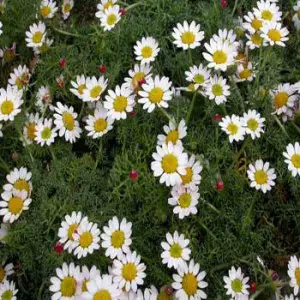Therapeutic Benefits of Akarkara
 Akarkara or Spilanthes acmella Murr is a tropical herb invaluable for its medicinal properties. “Akarkara’ is a Hindi name while, in English, it is known as Pellitory. The plant and its flowers resemble the chamomile in appearance and also in certain properties. It’s a perennial herb with small conical flowers which are yellow at the centre and white rays of petals by its side. Almost all the parts of the plant are applied in some use or the other. It has been extensively used in Ayurvedic treatments as a rejuvenator.
Akarkara or Spilanthes acmella Murr is a tropical herb invaluable for its medicinal properties. “Akarkara’ is a Hindi name while, in English, it is known as Pellitory. The plant and its flowers resemble the chamomile in appearance and also in certain properties. It’s a perennial herb with small conical flowers which are yellow at the centre and white rays of petals by its side. Almost all the parts of the plant are applied in some use or the other. It has been extensively used in Ayurvedic treatments as a rejuvenator.
Following are the benefits of the Akarkara herb that account for its worldwide popularity:
Perhaps the most significant use of Akarkara is as a cure for toothache. Hence it is also widely known as the “toothache plant’Â. Chewing the flowers of the herb is said to alleviate toothache and other disorders of the mouth. An analgesic agent in the flower head works to numb the ache.
Akarkara is effective on rheumatism, hemorrhoids, sore throat and fever.
The property of the herb to induce salivation makes it an ideal choice of consumption (in lozenge form) for dryness of the throat and mouth.
The leaves of the Akarkara plant are edible as a vegetable and are either cooked or eaten raw depending on which part of the world you are in. However, they impart a slight itchy sensation to the mouth and sometimes cause numbness. This property of the herb is being explored to find out how well it can be used as a local anesthetic.
The leaves of Akarkara are used for topical application for certain skin infections.
Extracts from Akarkara flowers are used as diuretic.
Extract from the roots of this herb is used as a purgative.
The herb has also been known to be a cure for dysentery.
Akarkara is widely used for its anti-inflammatory properties.
The aqueous root extract of the plant was used on rats in research studies to evaluate its effect as an aphrodisiac, especially in males. Studies were conducted to analyze its effects on sexual performance, spermatogenesis, and in the increase of sperm count with positive effects. Akarkara is also known to heal age-related sexual deficiencies.
Academic researches have established powerful larvicidal activities of the three species of Akarkara plant against malaria and filarial diseases. Based on that, an herbal extract of these species of Akarkara plant has been developed to act as a control for the disease causing mosquito vectors.
Akarkara is also sometimes used for its medicinal effect on the cardiovascular system.
The flowers of this plant are also of great ornamental value for designing natural flower ornaments.
It is amazing to note how a little herb can have so many curative purposes. The traditional system of Ayurveda specialized in identifying the properties of such plants and extracting their medicinal values. Researches are still being conducted to find out more about the benefits of Akarkara or to better establish some of its claimed therapeutic functions. There is no doubt that this flowering herb is a perfect combination of beauty and utility since the traditional times.